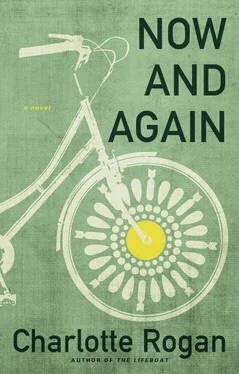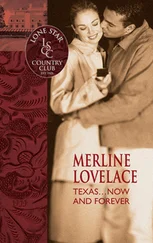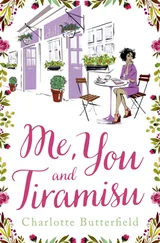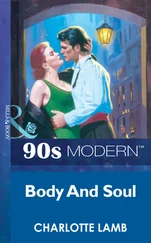“But what if we all felt that way?” asked Tula. “We’re certainly not going to change things if we don’t even try.” Now she was moving around the table to sit with Maggie so that the women were allied against the men. It was Will who cleared the last of the dishes and Lyle who served up the yellow cake while the women exchanged Rainbow mottos and advice — because they believed in Justice and because Maggie had been a Rainbow Girl too, once upon a time. Dream rainbow dreams! Your smile is your rainbow, and you are the pot of gold!
“Does anyone want ice cream?” asked Lyle. But no ice cream was to be found, so Will poured glasses of milk to go with the cake while Tula told them that the Rainbow Inspiration that year was Sandra Day O’Connor, the former Supreme Court Justice. “Despite graduating third in her law school class, the only job offer she could get was as a legal secretary. But she didn’t give up, and look what she accomplished.”
“A Rainbow Girl never gives up!” cried Maggie.
“Why don’t you contact her?” suggested Tula. “Some of the girls wrote to her a few years back and received a very nice letter in reply.”
Will wanted to shout that these two adults had nothing to do with him, that they had only been thrown together by chance — but it wasn’t only his parents. He too shared in the blame because he had lured Tula there under false pretenses: Future doctor! Normal family! Raised with love and optimism to believe that good would triumph in the end!
“Why don’t you write to her too — one Rainbow Girl to another,” Tula was suggesting. “It’s a long shot, but maybe she would give you some advice.”
“I couldn’t,” said Maggie. “Why would she care about me?”
“Once a Rainbow Girl, always a Rainbow Girl,” said Tula.
“If it’s advice you want, there’s no one better than Pastor Price,” interrupted Lyle. “He’s sure to have some thoughts about what to do. What do you say, Maggie? How about we go talk to him and leave these young people alone?”
“Good idea,” said Will, trading another despairing look with his dad. “You two go find the pastor, and Tula and I will finish cleaning up.” He had expected his mother to protest, but she didn’t. He had expected her to issue a set of instructions, but it was Lyle who said, “Don’t forget the dishwasher’s broken, so you have to wash and dry by hand.” Of course it was! “And don’t forget you have a game tomorrow evening.” He never forgot a game!
“Don’t forget that your mother and I both have to work, so you’ll probably need to get a ride.”
“I won’t forget,” said Will.
And then the candles were extinguished, replaced by the cheerful brightness of the overhead fluorescents, and Lyle and Maggie were out the door, after which Will crowded in at the sink next to Tula, getting in her way and letting his hands bump up against hers under the soapy water as they both tried to find the sponge. And suddenly he had to admit that in spite of his mother or even because of her, his first dinner with Tula was going pretty well.
5.8 Pastor Price
When the doorbell rang, Pastor Price flipped the television to a religious station before opening the door to find Lyle Rayburn clutching his wife by the elbow. Lyle was saying something about how Maggie wanted to quit her job again, and Maggie was saying no, she didn’t. “Slow down, slow down!” cried the pastor, ushering them into the living room, where they settled into the chairs he liked to use for visitors.
“Ask her about the stolen prison files,” said Lyle, which launched Maggie into a speech about the Constitution and prisoners’ rights.
“What is the point of a document that no one ever reads?” she asked.
At first the pastor thought she was talking about the Constitution, so he said, “I imagine the lawyers and judges read it.”
“Or ones that people aren’t even allowed to see,” said Maggie. “Ones meant only for a small, secret audience, even though they affect everyone else. Shouldn’t there be an open debate about that sort of thing?”
“I’d imagine that’s what the man’s trial was about,” said the pastor, trying to follow the thread.
“If that’s what you’d imagine, then you’d be wrong,” said Maggie. “These documents are from after the trial. They were hidden away in the prison basement until I found them.”
“Let’s all take a deep breath,” said the pastor. In order to illustrate, he took one himself. His lungs expanded against his rib cage, which swelled pleasantly against the soft brushed cotton of his shirt. Then he closed his eyes and slowly opened them again, as if he were emerging from a deep and peaceful trance. “I have my ear to the ground, and do you know what I hear?” he asked.
Maggie and Lyle didn’t know.
“I hear that Maggie has gotten in over her head and is looking for a graceful way out. If there’s anything I know about, it’s grace.”
Price was pleased with this formulation, but Maggie only stared grimly across the glass and mahogany coffee table while Lyle looked on, bewildered. Tiffany had cautioned him more than once not to start off with abstractions, so the pastor tried a more personal approach and told the couple that in order to become a preacher, he had had to constantly battle his anarchist tendencies, not to mention his libidinous ones. “What I lacked in inner self-control was thankfully imposed from without by the church. I shudder to think what might have happened if I had been allowed to run wild.”
“What would have happened?” asked Maggie.
“Praise the Lord we’ll never know! But my point is that total freedom is a very frightening concept.” Obedience was an underrated virtue, and the pastor had been looking for an opportunity to work it in when Tiffany stuck her blond head through the kitchen door and asked if anyone wanted a glass of sweet tea.
“Do you have fresh mint?” asked the pastor.
“I do.”
“And maybe some of those famous cookies?”
“Coming right up,” said Tiffany, retreating back into the kitchen.
The pastor tried to remember where he had left off, but it didn’t really matter since all roads led to the same place. “My point is that man-made structures — institutions like the church and the prisons, for instance — exist for a reason.”
“I’m sure they exist for a reason,” said Maggie. “But it’s not always the reason everyone thinks. That’s the thing that keeps me up at night.” Then she poured out a confusing story about profit motives and someone named Tomás and the ACLU and a woman who was in love with another someone named George.
The television screen filled with a close-up of a preacher, his face uplifted and shining with sweat. A choir began to sing, and the camera panned out to take in their satin robes, their sparkling eyes, their white teeth and open mouths. “Look at that! Will you just look at that?” said the pastor, unable to take his eyes off the screen. His own services were being broadcast on the radio, but he had recently been approached by a TV producer, and he was cautiously optimistic.
“We like what we see,” the producer had said when they met. “We also like what we hear about the Red Bud community. We’re envisioning a weekly reality feature where you counsel members of your flock.”
The counseling feature was in the pastor’s mind as he switched off the television set and turned to look at Maggie: she was attractive, articulate, and more than a little misguided. Hells bells — she’d be perfect for the show! He almost said it out loud — praise the Lord he didn’t — but this was just the sort of thing audiences would want to see.
A crash emanated from the kitchen. Hells bells! he thought again as Tiffany came scurrying into the room with a tray of drinks. “The cookies—” she said, but the pastor waved his hand and said to forget the cookies. He made a rectangle of his fingers as if he were setting up the frame: Maggie’s white face, Lyle’s frightened eyes. They’d be filming in the parish hall, so Tiffany’s stack of romance novels and the photographs of her in her high school cheerleading uniform wouldn’t be in the shot.
Читать дальше












